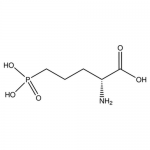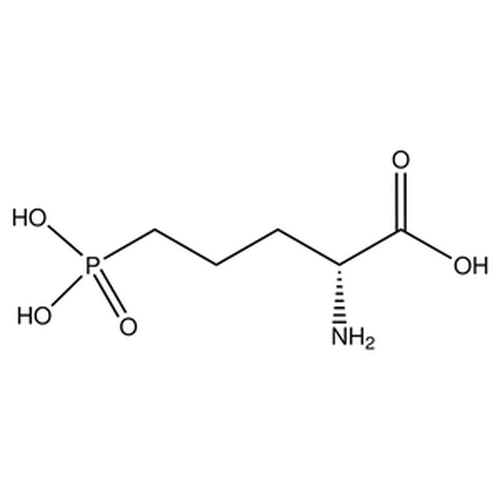| Product Name | D-AP5 |
| Description |
NMDA receptor antagonist |
| Purity | >99.5 |
| CAS No. | 79055-68-8 |
| Molecular Formula | C5H12NO5P |
| Molecular Weight | 197.13 |
| Field of Use | Not for use in humans. Not for use in diagnostics or therapeutics. For in vitro research use only. |
Properties
| Storage Temperature | -20ºC |
| Shipping Temperature | Shipped Ambient |
| Product Type | Antagonist |
| Solubility | Soluble in 100 mM water |
| Source | Synthetic |
| Appearance | White solid |
| SMILES | [C@@H]([NH3+])(CCC[P]([O-])([O-])=O)C([O-])=O |
| InChI | InChI=1S/C5H12NO5P/c6-4(5(7)8)2-1-3-12(9,10)11/h4H,1-3,6H2,(H,7,8)(H2,9,10,11)/t4-/m1/s1 |
| InChIKey | VOROEQBFPPIACJ-SCSAIBSYSA-N |
| Safety Phrases |
Classification: D2B Toxic Material Causing Other Toxic Effects, Moderate skin irritant, Moderate respiratory irritant, Moderate eye irritant Safety Phrases: S22 - Do not breathe dust. S24/25 - Avoid contact with skin and eyes. S36/37/39 - Wear suitable protective clothing, gloves and eye/face protection. Hazard statements: H315 Causes skin irritation. H319 Causes serious eye irritation. H335 May cause respiratory irritation. Precautionary statements: P261 Avoid breathing dust/ fume/ gas/ mist/ vapours/ spray. P264 Wash skin thoroughly after handling. P271 Use only outdoors or in a well-ventilated area. P280 Wear protective gloves/ eye protection/ face protection. P302 + P352 IF ON SKIN: Wash with plenty of soap and water. P304 + P340 IF INHALED: Remove victim to fresh air and keep at rest in a position comfortable for breathing. P305 + P351 + P338 IF IN EYES: Rinse cautiously with water for several minutes. Remove contact lenses, if present and easy to do. Continue rinsing. |
| Cite This Product | D-AP5 (StressMarq Biosciences Inc., Victoria BC CANADA, Catalog # SIH-411) |
Biological Description
| Alternative Names | D-amino-5-phosphonopentaoic acid |
| Research Areas | Glutamate Receptors, Ion Channels, Neuroscience, Neurotransmitter Receptors, NMDA Receptors |
| PubChem ID | 135342 |
| Scientific Background | D-AP5 (D-(-)-2-Amino-5-phosphonopentanoic acid) is a selective, competitive antagonist of the NMDA receptor, specifically targeting the glutamate binding site. NMDA receptors are critical for synaptic plasticity, learning, and memory, but their overactivation leads to excitotoxicity—a key contributor to neuronal death in neurodegenerative diseases such as Alzheimer’s, Huntington’s, and ALS. D-AP5 is widely used in neuroscience to investigate NMDA receptor-mediated signaling, synaptic transmission, and neuroprotection. By blocking excitotoxic calcium influx, D-AP5 serves as a valuable tool for studying mechanisms of neuronal injury and for developing therapeutic strategies aimed at modulating glutamatergic dysfunction in the CNS. |
| References |
1. Davies J., & Watkins J. (1982) Brain Res. 378-86. 2. Schulte M., Roon R., Chalmers D., Sunter D., & Koerner J. (1994) Brain Res. 203-7. |



Reviews
There are no reviews yet.